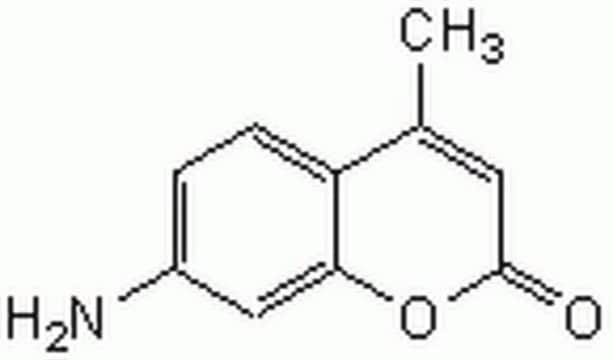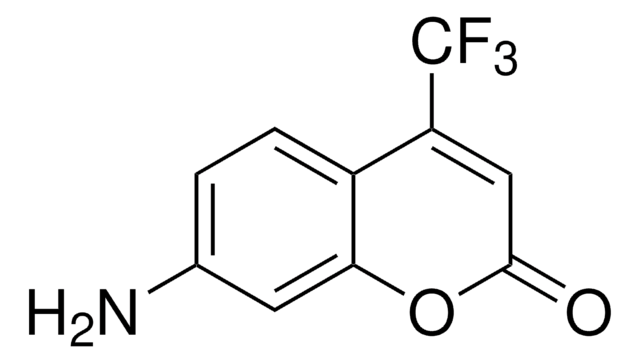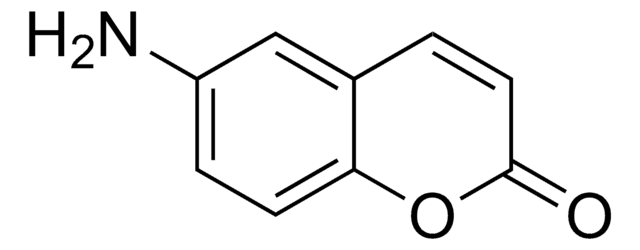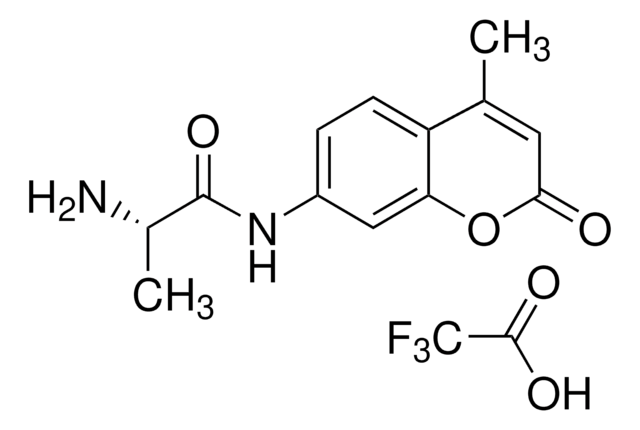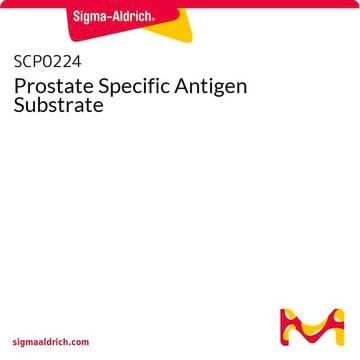A9891
7-Amino-4-methylcoumarin
chromophore for enzyme substrates, fluorogenic, ≥98% (HPLC), powder
Synonym(s):
Coumarin 120
About This Item
Recommended Products
product name
7-Amino-4-methylcoumarin, Chromophore for substrates
Quality Level
description
chromophore for enzyme substrates
Assay
≥98% (HPLC)
form
powder
mp
223-226 °C (lit.)
solubility
acetone: 10 mg/mL, clear, colorless to yellow
fluorescence
λex 365 nm; λem 440 nm in ethanol(lit.)
storage temp.
2-8°C
SMILES string
CC1=CC(=O)Oc2cc(N)ccc12
InChI
1S/C10H9NO2/c1-6-4-10(12)13-9-5-7(11)2-3-8(6)9/h2-5H,11H2,1H3
InChI key
GLNDAGDHSLMOKX-UHFFFAOYSA-N
Looking for similar products? Visit Product Comparison Guide
Application
- to determine cathepsin B like- activity
- as a substrate for leucine aminopeptidase (LAP)
- in chymotryptic assay
- as a standard to detect the activation of caspase-3 during
- sanguinarine-induced damage
- protection by human DEAD-box DDX3
Biochem/physiol Actions
Preparation Note
Other Notes
Storage Class Code
11 - Combustible Solids
WGK
WGK 3
Flash Point(F)
Not applicable
Flash Point(C)
Not applicable
Personal Protective Equipment
Certificates of Analysis (COA)
Search for Certificates of Analysis (COA) by entering the products Lot/Batch Number. Lot and Batch Numbers can be found on a product’s label following the words ‘Lot’ or ‘Batch’.
Already Own This Product?
Find documentation for the products that you have recently purchased in the Document Library.
Customers Also Viewed
Articles
Cathepsin B is a lysosomal cysteine proteinase with broad specificity. This protocol uses Nα–CBZ–Arg–Arg–7–amido–4–methylcoumarin as the substrate for fluorometric detection of Cathepsin B activity.
Cathepsin B is a lysosomal cysteine proteinase with broad specificity. This protocol uses Nα–CBZ–Arg–Arg–7–amido–4–methylcoumarin as the substrate for fluorometric detection of Cathepsin B activity.
Cathepsin B is a lysosomal cysteine proteinase with broad specificity. This protocol uses Nα–CBZ–Arg–Arg–7–amido–4–methylcoumarin as the substrate for fluorometric detection of Cathepsin B activity.
Cathepsin B is a lysosomal cysteine proteinase with broad specificity. This protocol uses Nα–CBZ–Arg–Arg–7–amido–4–methylcoumarin as the substrate for fluorometric detection of Cathepsin B activity.
Our team of scientists has experience in all areas of research including Life Science, Material Science, Chemical Synthesis, Chromatography, Analytical and many others.
Contact Technical Service

